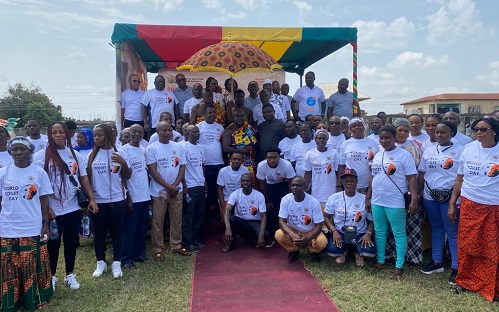
The Ministry of Sanitation and Water Resources is collaborating with the Ministry of Justice and Attorney General to set aside specific dates for the trial of sanitation cases which include construction of toilets.
It would also collaborate with the Local Government Decentralisation and Rural Development to enforce the bye-laws requiring every household to have a decent toilet facility.
It has, therefore, urged all households in the country to have a decent toilet facility in their homes to avoid being dragged to the law courts.
According to the Ministry, about 18 per cent of Ghanaians were still indulged in open defecation and “we really need to do something about this as a country”.
“We will pursue aggressively the one house-one toilet initiative to ensure households get decent toilets in their homes, and will prosecute offenders.”
Ms Cecilia Abena Dapaah, Minister of Sanitation and Water Resources, said these in a speech read on her behalf by her Deputy, Mr Issahaku Chinnia Amidu, at the launch of this year’s “World Toilet Day”.
Held at the Okese Park at Ejisu in the Ejisu Municipality, Ashanti region, over the weekend, the commemoration focused on the impact of the sanitation crisis on groundwater.
It was a platform to raise awareness on that one national challenge as a country under the theme, “Sanitation and Groundwater” with a campaign tag “Making the Invisible Visible”.
The Minister said 200,000 more toilets would be added to the total toilet stock in the country as part of measures to stop open defecation in the country, stressing “Ghana like most African countries is seriously off track to attain safe toilets for all by 2030.
“With only eight years to go, it requires that we work four times faster to meet our SDG target. As people, our lives revolve around toilets directly or indirectly and we have to take issues of toilets serious”, she underscored.
She noted that inadequate sanitation systems spread human waste into rivers, lakes and soil, polluting the water resources underneath, “however, this problem seems to be invisible. Invisible because it happens underground unnoticed. Invisible because it happens in the poor and most marginalised communities”.
The Minister reiterated the need for the Metropolitan, Municipal and District Assemblies to enforce their bye-laws to complement all the efforts made towards ensuring clean, safe and healthy communities in Ghana.
“I believe this will go a long way to stop open defecation and increase access to improved household toilets,” she remarked.
Mr Harrold Esseku, Senior Water, Sanitation and Hygiene (WASH) specialist, mentioned The World Bank funded project which started in 2015, and aimed at increasing access to improved sanitation and water supply in the Greater Accra Metropolitan Assemblies (GAMA) and Greater Kumasi Metropolitan Assemblies (GKMA), with emphasis on low income communities and to strengthen management of environmental sanitation in the GAMA and the GKMA.
The parent GAMA Sanitation and Water Project was successfully implemented from August 2014 – December 2020 with about 240,212 people having access to improved household toilets.
In Kumasi (GKMA), the project was being implemented in eight Metropolitan and Municipal Assemblies, including Asokwa, Oforikrom, old Tafo, Suame, Kwadaso, and the Asokore Mampong Municipal Assembly (AMMA), and Ejisu Municipality.
Under the project, Mr Esseku said about 30,000 household toilet facilities would be provided for people with low income in the GKMA, and so far about 5,000 households have been provided with decent toilets.
The Ejisu Municipal Chief Executive, Samuel Oduro Frimpong, announced that Ejisu topped the list with over 1,000 household toilets provided under the GKMA project, reducing open defecation in the Municipality.
The GAMA/GKMA project is part of government’s determination to providing pragmatic measures to finding lasting solution to the water and sanitation problems in those areas.
The bio-digester toilet system is the main containment technology.
FROM KINGSLEY E. HOPE, EJISU







